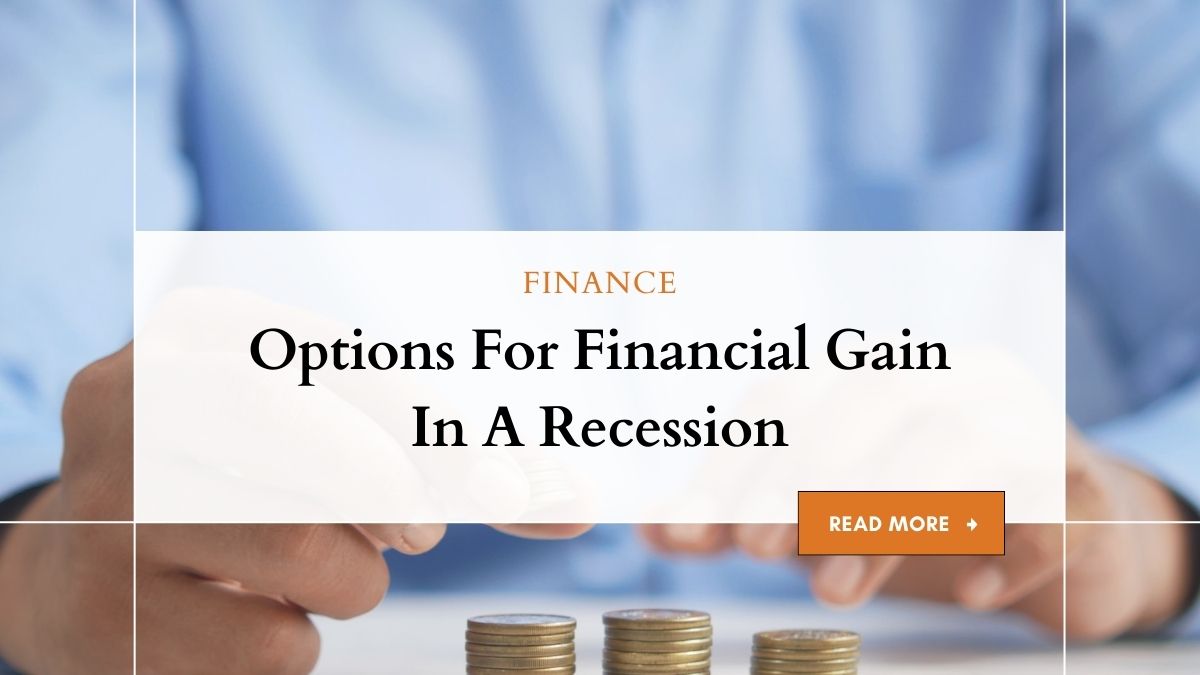
Recession can be a scary time for many people, especially when it comes to their finances.
Facing an uncertain economy, many are wondering how they can leverage the current market conditions to make sure they remain financially stable.
Fortunately, during these times of economic difficulty, there are options available that can help you maintain and even gain financial footing.
Here are 8 options for financial gain in a recession that are worth considering:
Also, you can able to know,
1. Raw land investing
Raw land investing can be a great option to consider during times of economic difficulty. Raw land is undeveloped, uncultivated real estate that is not modified or improved in any way.
It may include cropland, prairie, woodlands, meadows, undeveloped hillsides, and more. Investing in raw land has several benefits – it’s relatively safe from market fluctuation and it tends to appreciate over time as development increases near the property.
Plus, it yields no direct costs such as taxes or insurance premiums until you decide to develop the property.
By investing in raw land, you can capitalize on its potential growth while investing a relatively low amount of money upfront. It can also be a great way to diversify your portfolio and hedge against economic downturns.
2. Investing in dividend-paying stocks
Investing in dividend-paying stocks can be another way to make money during a recession. A dividend is a portion of a company’s earnings that it pays out to shareholders, usually every quarter.
These investments provide income on top of any stock appreciation that may occur. Dividend-paying stocks tend to be relatively stable and can help investors balance their portfolios in an unstable market.
Plus, many companies even increase their dividends during times of economic difficulty as an incentive for investors.
As with any investment, however, it’s important to understand the risk you are taking before investing – some companies may suspend their dividends altogether if they enter financial trouble due to the slowdown of the economy.
3. Municipal bonds
Investing in municipal bonds can be a great way to capitalize on the current market conditions. Municipal bonds are debt securities issued by local and state governments, and they typically offer a higher yield than traditional Treasury bonds.
They tend to be less risky than other investments since most of them are backed by taxes or revenue from public works projects.
Plus, many municipal bonds are exempt from federal income tax, so investors can take advantage of additional returns that remain untaxed.
Before investing in municipal bonds, however, it’s important to understand their terms and conditions carefully – some may have early redemption penalties or carry high-interest rates if held for an extended period.
4. Buying distressed assets
Buying distressed assets is another way to make money during a recession. Distressed assets are those that have become undervalued due to economic downturns, such as foreclosed homes or businesses that are struggling financially.
Purchasing distressed assets can be risky but also has the potential for high returns if you select the right properties and know when to sell.
It’s important to do your research before investing in this type of asset – make sure you understand the risks involved and how to properly evaluate the value of a property.
Furthermore, it’s always wise to look into any legal issues related to buying these types of assets before making a purchase.
5. Investing in gold
Investing in gold is another option worth considering during times of economic downturn. Gold is typically seen as a safe-haven asset and can help investors diversify their portfolios and protect against market fluctuations.
It also provides an opportunity to capitalize on any potential inflation that may occur during a recession – gold tends to increase in value as the purchasing power of the U.S. dollar declines, which can provide investors with added economic security.
However, it’s important to understand the risks involved when investing in this asset – make sure you research the current gold markets closely before allocating any portion of your portfolio to this commodity.
6. Investing in foreign currencies
Investing in foreign currencies is another option for people looking to make money during a recession. Investing in foreign currencies can be profitable, as it allows investors to capitalize on potential exchange rate fluctuations that occur due to changes in global markets or economies.
However, this type of investment comes with its own set of risks – exchange rates can fluctuate quickly and unpredictably, so investors must be prepared to handle volatile conditions if they choose to invest.
Additionally, investing in foreign currencies requires an understanding of the macroeconomic environment of each currency – making sure you are aware of any potential political or economic shifts that could affect your investment is key.
7. Cryptocurrency
Investing in cryptocurrency is another option to consider during a recession. Cryptocurrencies, such as Bitcoin, are digital assets that can be traded and used for transactions on the blockchain – they are decentralized, meaning they are not regulated by any government or financial institution.
While investing in cryptocurrencies carries its own set of risks, this type of investment can also provide potential returns if you make the right choices.
It’s important to do your research before diving into this market – make sure you understand how each currency works and the technology behind it so you have an understanding of what you’re getting into.
8. Real estate investment trusts (REITs)
Investing in real estate investment trusts (REITs) is another option for people looking to make money during a recession.
REITs are companies that own and manage income-producing real estate, such as office buildings or shopping centers.
Investing in REITs can be beneficial because they typically have a lower risk profile than other investments, as well as the potential for high returns if you select the right properties.
Additionally, there is less volatility with REITs compared to stocks since their values tend to remain relatively consistent over time.
Don’t miss: Expense Card for Contract Employees
The bottom line
As we saw, there are a variety of options for making money during an economic downturn. Every type of asset has its own set of risks that must be considered, so it’s important to do your research before investing in any specific asset.
Additionally, having a diversified portfolio will help reduce risk and provide more stability if the markets take a turn for the worse.
With careful planning and consideration, you can navigate these uncertain times successfully by utilizing one or more of the options listed above. Good luck!














